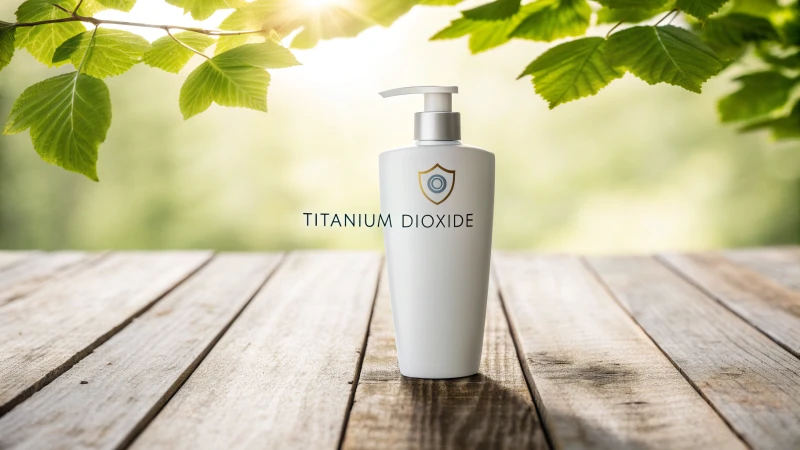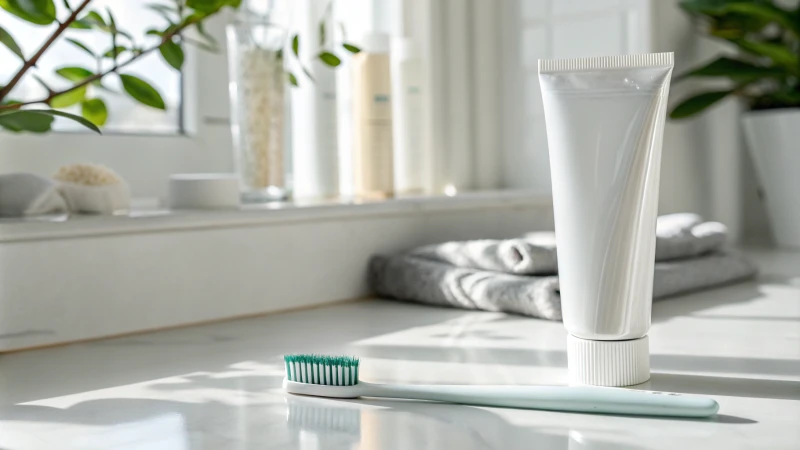
Have you ever thought about what’s truly inside your toothpaste? Let’s explore one important ingredient – titanium dioxide – and discover what it truly does for our smiles.
Titanium dioxide (TiO2) is important in toothpaste. It provides whitening, thickening and mild abrasive traits. It improves the look of toothpaste. It also helps clean teeth. This happens without harming enamel.
I remember the first time I felt curious about the ingredients in my toothpaste. I was standing in the aisle and noticed the term ‘titanium dioxide.’ I wondered why it contributed to the fresh, bright feeling after brushing. It turns out, titanium dioxide helps whiten toothpaste. It acts as a gentle abrasive too. It probably makes our teeth feel polished and clean. Additionally, it keeps everything mixed nicely. Our paste has a perfect texture every time we squeeze it out. It’s fascinating how something so small really plays a big role in our daily routines.
[claim claim=”Titanium dioxide enhances the whitening effect of toothpaste.” istrue=”true” explanation=”Titanium dioxide is used in toothpaste to improve its whitening capabilities, making teeth appear cleaner and brighter without harming enamel.”]
[claim claim=”Titanium dioxide is harmful to dental health when used in toothpaste.” istrue=”false” explanation=”Current research indicates that titanium dioxide is safe for use in toothpaste and does not pose risks to dental health.”]
What Are the Benefits of Titanium Dioxide in Toothpaste?
Have you ever stopped to wonder what helps your toothpaste work well and look nice? Titanium dioxide is a very interesting ingredient with that job. It plays a big part. Let’s explore how this compound changes our daily tooth brushing.
Titanium dioxide in toothpaste whitens teeth. Its presence really improves the texture. It acts as a gentle abrasive to remove stains. This element probably helps maintain product stability. This ingredient is very popular for effective oral care.

Aesthetic Appeal of Titanium Dioxide
I remember the first time I squeezed a fresh tube of toothpaste. The bright white paste sparkled against the dull bathroom sink. Simple color influences our choices incredibly. Titanium dioxide (TiO2) creates that brilliant whiteness. This makes toothpaste eye-catching and gives a sense of reliability. It’s the cherry on top that draws me to pick that brand every time.
Looks aren’t everything! TiO2 also provides a smooth texture. Imagine the comfort of creamy toothpaste gliding over teeth. It turns brushing into a treat instead of a chore. These small details encourage sticking to a dental hygiene routine. They truly do.
If you’re curious about more cosmetic benefits, check out cosmetic uses of titanium dioxide1.
Functional Benefits in Oral Care
Now, let’s discuss the practicality of titanium dioxide. TiO2 goes beyond charm. It is a gentle abrasive that keeps smiles bright. Sometimes harsh products worry me. They promise stain removal but might harm enamel or gums. TiO2 reassures me by removing stains and plaque effectively. It doesn’t damage teeth.
Here’s a brief comparison of toothpaste with and without titanium dioxide:
| Feature | With Titanium Dioxide | Without Titanium Dioxide |
|---|---|---|
| Stain Removal | Yes | Varies |
| Smooth Texture | Yes | No |
| Aesthetic Quality | High | Lower |
| Enamel Safety | Yes | Yes |
For those interested in the specifics of abrasiveness, visit abrasives in dental products2.
Stability and Consistency
Stability is crucial, especially in daily toothpaste use. Titanium dioxide keeps everything mixed and consistent. Have you ever seen toothpaste ingredients separate unpleasantly? Thanks to TiO2, toothpaste is always ready to use. It delivers reliable results each time.
The role of TiO2 in maintaining texture can be compared to other stabilizers used in various personal care items:
| Ingredient | Purpose | Common Use |
|---|---|---|
| Titanium Dioxide | Stabilization & Whitening | Toothpaste |
| Sorbitol | Humectant & Thickener | Toothpaste & Mouthwash |
| Xanthan Gum | Thickening & Emulsifying Agent | Creams & Lotions |
To learn about stabilizing agents in oral care, visit stabilizers in cosmetics3.
Safety Considerations
Safety is vital for items we put in our mouths. Titanium dioxide is generally safe for oral use. However, I’ve seen concerns about its nanoparticle form. Regulatory authorities like the FDA provide guidelines for safe use within specific concentration limits, allowing manufacturers to incorporate it safely into their products.
This comfort ensures my peace of mind when choosing dental products; they are checked for safety.
For details on safety regulations, see dental ingredient safety4.
Conclusion of Benefits
In conclusion, titanium dioxide offers wonderful functional and aesthetic benefits in toothpaste. It acts as a gentle abrasive and keeps the product stable and appealing, enhancing the oral hygiene experience overall.
[claim claim=”Titanium dioxide enhances the aesthetic appeal of toothpaste.” istrue=”true” explanation=”Its bright white color makes toothpaste visually appealing, influencing consumer choices and perceptions of effectiveness.”]
[claim claim=”Titanium dioxide is harmful to dental enamel.” istrue=”false” explanation=”Contrary to this claim, titanium dioxide is safe for enamel and helps remove stains without damage.”]
Are There Any Safety Concerns Regarding Titanium Dioxide?
When I look at personal care products, I often wonder about the safety of ingredients like titanium dioxide (TiO2). What is the truth about using it? Let’s explore the details together.
Worries about titanium dioxide (TiO2) center on its nanoparticle form. Organizations, such as the FDA, view it as safe if used within certain limits. However, breathing in these particles sparks continuous discussions. Staying informed might help us understand its presence in daily items.
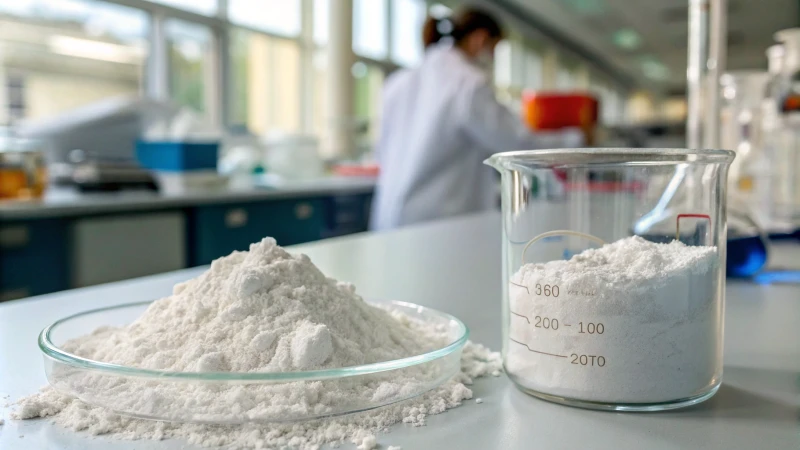
Understanding Titanium Dioxide (TiO2)
Titanium dioxide (TiO2) is not only made in labs; it exists in many everyday items like toothpaste and sunscreen. When you see it on a toothpaste label, you might wonder why it is used. This compound whitens and thickens, giving toothpaste a smooth feel and bright color. White and smooth describe its effect.
It’s important to examine the role of TiO25 in these products, as consumers need to be informed about what they are using.
Safety Regulations and Guidelines
Safety matters, especially with titanium dioxide. Regulatory bodies like the FDA and the European Food Safety Authority have set guidelines for the safe use of titanium dioxide. According to their assessments, TiO2 is mostly safe when used within established concentration limits in products for oral care.
| Regulatory Body | Status | Notes |
|---|---|---|
| FDA | Generally Recognized as Safe (GRAS) | Safe at specified concentrations |
| EFSA | Acceptable Daily Intake (ADI) | Established limits for safety |
For more details, you can look at this FDA guidance6.
Concerns Over Nanoparticles
Despite safety rules, worry sometimes appears with TiO2 nanoparticles. The concerns primarily revolve around inhalation risks and potential long-term health effects. Many think about these risks in skin products or items used by families.
Some studies ask about nanoparticles’ safety in cosmetics. Exploring nanoparticle safety7 can provide valuable insights into this matter. Staying informed helps understand these issues.
Public Perception and Health Risks
People have mixed feelings about titanium dioxide. While many trust regulatory assessments, some consumers are increasingly cautious about ingredients in their personal care products. This skepticism has led to calls for more transparency and labeling in product formulations.
Understanding potential health risks of titanium dioxide helps in choosing wisely. Some areas worry us:
- Inhalation: Breathing in nanoparticles may irritate the lungs.
- Ingestion: Digestive health concerns arise when TiO2 is in food.
For detailed health information, check this research study8.
Conclusion and Future Directions
The titanium dioxide debate is ongoing. Continuous research and public education are very important. As industries change, safety talks and consumer knowledge about TiO2 will too.
Keeping up with studies and regulatory news can really help in making wise product choices. Those eager to learn probably benefit from searching for titanium dioxide safety research9 to stay informed.
[claim claim=”Titanium dioxide is safe in regulated concentrations.” istrue=”true” explanation=”Regulatory bodies like the FDA have classified titanium dioxide as Generally Recognized as Safe (GRAS) within specified limits for various products.”]
[claim claim=”Nanoparticles of titanium dioxide pose no health risks.” istrue=”false” explanation=”Concerns exist regarding inhalation risks from nanoparticles, indicating potential health implications that require further research and scrutiny.”]
What Alternatives Exist for Toothpaste Without Titanium Dioxide?
Do you ever look at your toothpaste tube and wonder what is truly inside? Discovering options without titanium dioxide may surprise you. It might even bring some delightful experiences.
If you search for toothpaste options without titanium dioxide, think about natural choices like baking soda and coconut oil. Eco-friendly commercial brands also offer choices. Homemade recipes provide control over ingredients. This method really helps in effective oral care.
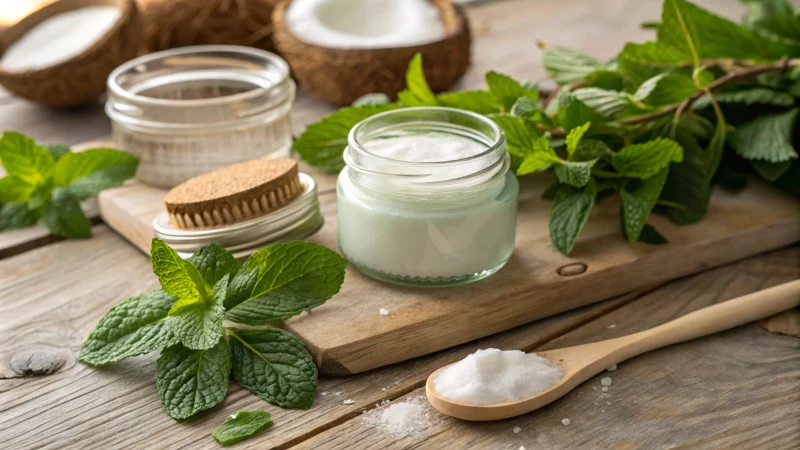
Natural Toothpaste Choices
We are becoming more aware of what enters our bodies, like with daily toothpaste. If you wish to skip titanium dioxide, good news awaits! Several natural toothpaste choices overflow with plant-based goodness. Here are key ingredients I use in my oral care:
- Baking Soda: A gentle abrasive that neutralizes mouth acids well. It’s fantastic for keeping oral health.
- Coconut Oil: I love coconut oil for its antibacterial nature. It really cuts down plaque and feels soothing while brushing.
- Essential Oils: Oils like tea tree and peppermint offer refreshing flavors and antimicrobial benefits.
These ingredients change your oral care to a more natural experience. Curious about homemade options? Check online for natural toothpaste recipes10.
Store-Bought Choices
| If you prefer quick purchases, many brands skip titanium dioxide. I found a few that I enjoy: | Brand Name | Key Ingredients | Specialty |
|---|---|---|---|
| Tom’s of Maine | Fluoride, Baking Soda | Natural flavors, no artificial dyes | |
| Jason Natural | Aloe Vera, Baking Soda | Vegan-friendly | |
| Hello Products | Coconut Oil, Charcoal | Eco-friendly packaging |
These brands focus on clear ingredient lists, which matter a lot to me. It feels good knowing what’s entering my mouth! Discover more about store-bought alternatives11 to find your match.
Homemade Toothpaste Recipes
Feeling adventurous? Creating toothpaste at home is both enjoyable and satisfying. Here are two easy recipes I tried:
-
Coconut Oil Toothpaste
- Ingredients: 1/2 cup coconut oil, 1/4 cup baking soda, essential oils (such as peppermint) for flavor.
- Instructions: Blend ingredients until smooth and store in an airtight container.
-
Aloe Vera Toothpaste
- Ingredients: 1/4 cup aloe vera gel, 1/4 cup baking soda, a few drops of peppermint oil.
- Instructions: Mix well and store in a jar.
You can easily customize these recipes based on your preferences! For more on homemade toothpaste, check out homemade toothpaste benefits12.
[claim claim=”Natural toothpaste can be made without titanium dioxide.” istrue=”true” explanation=”Homemade toothpaste recipes often use natural ingredients like baking soda and coconut oil, avoiding titanium dioxide completely.”]
[claim claim=”All commercial toothpaste brands contain titanium dioxide.” istrue=”false” explanation=”Many brands, such as Tom’s of Maine and Hello Products, offer titanium dioxide-free options for consumers.”]
How Does Titanium Dioxide Compare to Other Whitening Agents?
Do you know why some toothpaste promises a bright smile? Titanium dioxide (TiO2) is often the secret ingredient. But how does it compare with other whitening agents? Let’s explore its effectiveness and safety together.
Titanium dioxide is a popular whitening ingredient. It performs really well in toothpaste. It gives toothpaste an appealing bright white color. It also gives it a pleasant texture. Other options include calcium carbonate and hydrogen peroxide. TiO2 provides unique benefits. It also raises some safety questions. Consider these concerns very seriously.
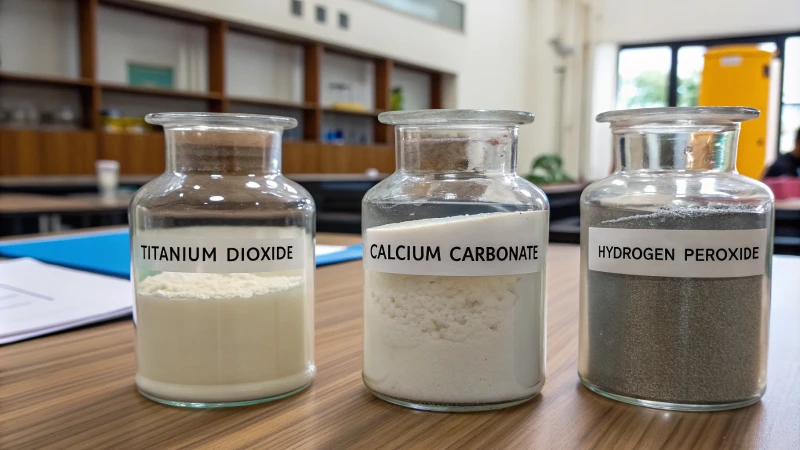
Understanding Whitening Agents
Whitening agents are substances used to lighten the color of products, and they vary widely in effectiveness and application. Titanium dioxide (TiO2) is one of the most commonly used agents, especially in dental care products like toothpaste. But how does it compare to alternatives?
| Comparison Table of Whitening Agents | Agent | Source | Common Uses | Safety Concerns |
|---|---|---|---|---|
| Titanium Dioxide (TiO2) | Mineral | Toothpaste, paints | Nanoparticle form under scrutiny | |
| Calcium Carbonate | Mineral | Toothpaste, cleaners | Generally regarded as safe | |
| Zinc Oxide | Mineral | Sunscreen, ointments | Rare allergic reactions | |
| Sodium Bicarbonate | Chemical | Baking, cleaning | Safe, but abrasive | |
| Hydrogen Peroxide | Chemical | Teeth whitening | Skin irritation possible |
Effectiveness of Titanium Dioxide
Titanium dioxide impresses me with its ability to brighten toothpaste. Its high refractive index makes everything look very bright! Besides whitening, it improves the texture. Imagine a smooth, creamy paste gliding on your teeth, making brushing feel luxurious. Its mild abrasiveness helps remove surface stains gently without damaging enamel.
Studies show toothpastes with TiO213 effectively remove coffee and tea stains. That’s why I trust TiO2 – it feels like my secret weapon for a bright smile!
Alternative Whitening Agents
TiO2 is fantastic, but other agents also deserve attention:
- Calcium Carbonate: Common in many toothpastes as an abrasive. It is safe and non-toxic, though less effective for whitening than TiO2.
- Zinc Oxide: I appreciate zinc oxide for whitening and its antibacterial properties. It’s used in sunscreens and creams too, offering extra protection.
- Hydrogen Peroxide: I’ve tried hydrogen peroxide for more intense whitening. It’s very effective but can cause sensitivity if overused.
I often consider, "What are the safety concerns associated with titanium dioxide?14" It’s important to stay informed.
Regulatory Perspectives
Regarding safety, it’s comforting to know that bodies like the FDA and EFSA see TiO2 as safe in cosmetics and dental products within limits. Yet, I feel a bit uneasy about its nanoparticle form discussions. It makes me think about the future of titanium dioxide in consumer products15. New innovations might be coming.
Conclusion (Not Included)
By looking at these details, I hope you feel informed when picking whitening agents for daily use. Knowledge helps us get the bright smile we all want!
[claim claim=”Titanium dioxide is a common ingredient in toothpaste.” istrue=”true” explanation=”TiO2 is widely used in dental care products, particularly toothpaste, due to its whitening properties.”]
[claim claim=”Calcium carbonate is more effective than titanium dioxide for whitening.” istrue=”false” explanation=”Calcium carbonate is less effective for whitening compared to TiO2, despite being safe.”]
Conclusion
Titanium dioxide enhances toothpaste by providing whitening, texture, and stability. It’s a safe abrasive that effectively cleans teeth without damaging enamel.
-
Discover how titanium dioxide enhances toothpaste effectiveness and safety through this detailed exploration. ↩
-
Learn about the role of abrasives like titanium dioxide in improving dental hygiene with this informative link. ↩
-
Find out how stabilizers like titanium dioxide ensure consistency in toothpaste formulations by following this link. ↩
-
Gain insights into the safety regulations concerning titanium dioxide and its use in dental products by clicking here. ↩
-
Explore credible sources on titanium dioxide safety to stay informed about any health risks associated with its use in products. ↩
-
Understanding FDA guidelines can help clarify how titanium dioxide is regulated in various products. ↩
-
This search will provide insights into the public concerns surrounding titanium dioxide and its implications for consumer products. ↩
-
Stay updated on ongoing research about the safety of titanium dioxide to make informed choices regarding its use in your products. ↩
-
This query will lead you to studies examining the long-term effects of titanium dioxide exposure, helping you understand its impact better. ↩
-
Explore various alternatives to titanium dioxide toothpaste that prioritize health and safety. ↩
-
Find a list of commercial toothpaste brands that do not use titanium dioxide. ↩
-
Learn how to make your own toothpaste at home with safe ingredients. ↩
-
Explore the safety concerns surrounding titanium dioxide and discover how it compares to safer alternatives. ↩
-
Find out more about the effectiveness of titanium dioxide versus other whitening agents like calcium carbonate. ↩
-
Learn about regulatory guidelines regarding titanium dioxide usage in cosmetics and food products. ↩




